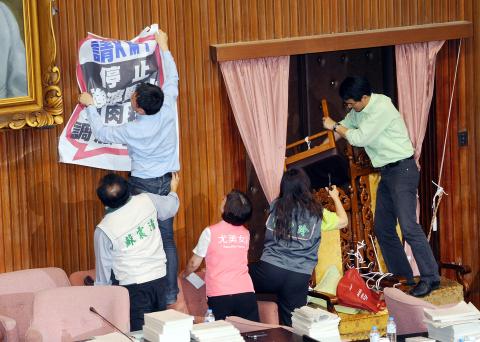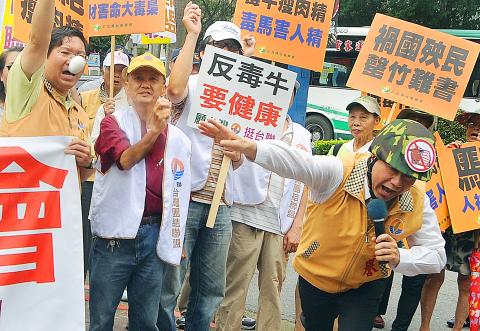The executive branch last night asked the legislature to hold a provisional session to vote on a bill that would allow beef imports containing residues of the livestock feed additive ractopamine after the legislative session ended at 6pm yesterday without voting on the beef issue.
The Presidential Office and the Executive Yuan issued the call following a three-hour meeting between President Ma Ying-jeou (馬英九), Premier Sean Chen (陳冲), Legislative Speaker Wang Jin-pyng (王金平) and top officials on solutions to the stalled draft bill on beef -containing ractopamine residues.
Chinese Nationalist Party (KMT) caucus whip Lin Hung-chih (林鴻池) last night said the caucus would table a motion for an extra session next week to pass the amendment to the Act Governing Food Sanitation (食品衛生管理法).

Photo: Lo Pei-der, Taipei Times
“The beef issue will be the only subject discussed at the provisional session. We hope that it can be held next week,” he said.
After the KMT caucus submits the proposal, Wang must call an informal meeting for lawmakers to decide whether to hold the extra session.
The conclusion reached at the meeting called by Ma last night departed from the KMT caucus’ earlier position, with KMT lawmakers supporting a proposal at a caucus meeting held on Thursday to ask the Executive Yuan to issue an executive order to relax the ban on beef containing ractopamine.

Photo: Liao Chen-huei, Taipei Times
Meanwhile, Democratic Progressive Party caucus whip Ker Chien-ming (柯建銘), said the caucus would do everything in its power to block the amendment.
“It is unavoidable that there will be a fight if the KMT tries to ram through the amendment,” Ker said.
In light of the failure of the legislature to pass the amendment yesterday, the last day of the legislative session, the American Institute in Taiwan (AIT) expressed the hope that “the Executive Yuan will finally be able to bring this to a speedy resolution.”
“We maintain that US beef is safe and remind Taiwanese consumers that millions of people in the US, Canada, Mexico, Japan, Korea, and many other countries around the world have continued to enjoy US beef without a single report of ill effects linked to ractopmaine,” AIT spokesperson Sheila Paskman said.
The AIT was “disappointed that some in Taiwan chose to make the discussion about US beef a political issue and intentionally provide misleading and in many cases false information to political gains,” Paskman said.
Earlier yesterday Ma reiterated his expectation that the issue of US beef imports would be resolved as soon as possible when meeting with Harvard University professor Ezra Vogel at the Presidential Office. He said that lifting the ban on the import of US beef containing ractompaine residue would facilitate Taiwan’s trade relations with the US and other countries.
Ma said this was a “critical moment” for Taiwan to finally deal with the issue of US beef imports, so as to speed up trade negotiations with the US and other trade partners.

People can preregister to receive their NT$10,000 (US$325) cash distributed from the central government on Nov. 5 after President William Lai (賴清德) yesterday signed the Special Budget for Strengthening Economic, Social and National Security Resilience, the Executive Yuan told a news conference last night. The special budget, passed by the Legislative Yuan on Friday last week with a cash handout budget of NT$236 billion, was officially submitted to the Executive Yuan and the Presidential Office yesterday afternoon. People can register through the official Web site at https://10000.gov.tw to have the funds deposited into their bank accounts, withdraw the funds at automated teller

PEACE AND STABILITY: Maintaining the cross-strait ‘status quo’ has long been the government’s position, the Ministry of Foreign Affairs said Taiwan is committed to maintaining the cross-strait “status quo” and seeks no escalation of tensions, the Ministry of Foreign Affairs (MOFA) said yesterday, rebutting a Time magazine opinion piece that described President William Lai (賴清德) as a “reckless leader.” The article, titled “The US Must Beware of Taiwan’s Reckless Leader,” was written by Lyle Goldstein, director of the Asia Program at the Washington-based Defense Priorities think tank. Goldstein wrote that Taiwan is “the world’s most dangerous flashpoint” amid ongoing conflicts in the Middle East and Russia’s invasion of Ukraine. He said that the situation in the Taiwan Strait has become less stable

CONCESSION: A Shin Kong official said that the firm was ‘willing to contribute’ to the nation, as the move would enable Nvidia Crop to build its headquarters in Taiwan Shin Kong Life Insurance Co (新光人壽) yesterday said it would relinquish land-use rights, or known as surface rights, for two plots in Taipei’s Beitou District (北投), paving the way for Nvidia Corp to expand its office footprint in Taiwan. The insurer said it made the decision “in the interest of the nation’s greater good” and would not seek compensation from taxpayers for potential future losses, calling the move a gesture to resolve a months-long impasse among the insurer, the Taipei City Government and the US chip giant. “The decision was made on the condition that the Taipei City Government reimburses the related

FRESH LOOK: A committee would gather expert and public input on the themes and visual motifs that would appear on the notes, the central bank governor said The central bank has launched a comprehensive redesign of New Taiwan dollar banknotes to enhance anti-counterfeiting measures, improve accessibility and align the bills with global sustainability standards, Governor Yang Chin-long (楊金龍) told a meeting of the legislature’s Finance Committee yesterday. The overhaul would affect all five denominations — NT$100, NT$200, NT$500, NT$1,000 and NT$2,000 notes — but not coins, Yang said. It would be the first major update to the banknotes in 24 years, as the current series, introduced in 2001, has remained in circulation amid rapid advances in printing technology and security standards. “Updating the notes is essential to safeguard the integrity